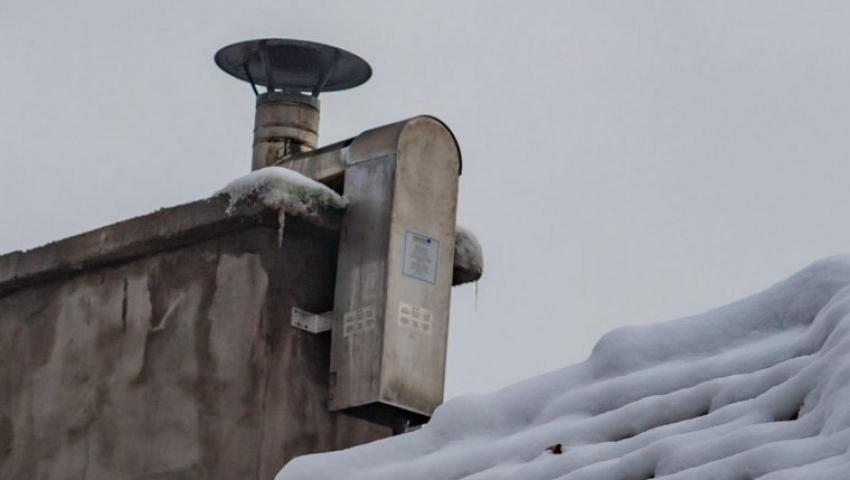The Road to Clean Air: How Building Renovation Can Solve the Solid Fuel Heating Problem

Renovation of buildings in Sofia sometimes involves installing filters on chimneys to separate fewer fine particles. But this is an energy-intensive undertaking.
In Sofia and the surrounding towns, as well as throughout Bulgaria, thousands of households still rely on wood and coal for heating. However, this choice can come at a high price – both for the family budget and for the air quality and health of the inhabitants. A new study by the Energy Efficiency Center EnEffect analyzes the energy characteristics of the most common types of buildings that use solid fuel heating and models different scenarios for their renovation. The goal? To find optimal solutions that provide comfort, savings and clean air for everyone.
The study covers the three main types of buildings that most often use solid fuels for heating: small single-family buildings, larger houses and apartments in multi-family residential buildings. The main conclusion is that without energy efficiency measures, even replacing the heating appliance is not enough to achieve significant savings and improve the microclimate. The best results, especially in terms of operating costs of households in the long term, are observed with a combined approach - replacing the appliance and renewing the building envelope.
Different scenarios, different results
The analysis examines several possible paths for housing renovation, which also have a direct effect on limiting air pollution from domestic heating:
Replacing the heating appliance only – switching to air conditioners, pellet boilers or heat pumps (air-to-water) provides more efficient heating, but heat losses through the walls, roof and windows remain significant.
Replacing the heating appliance + windows – reduces heat losses and improves comfort, but the effect on heating costs is limited.
Renovation to national standards – includes replacing the heating appliance and measures on the building envelope until reaching the regulatory energy efficiency class, which reduces heating costs by up to 50%.
Deep renovation – a complete renovation of the residential building above the minimum regulatory requirements, which leads to savings of over 60% of energy costs and significantly improves indoor comfort.
Among the main challenges facing households are the initial investments. Although deep renovation brings the greatest long-term benefits, it is difficult for many families to afford it without financial support.
Key findings and recommendations
The report highlights several key findings that need to be taken into account in energy efficiency and clean air policies:
The combination of energy efficiency and replacement of heating appliances gives the best results. Replacing the heating appliance alone is not enough if buildings continue to lose a large amount of heat.
Greater access to financing for deep renovation is needed. The high initial investment is a major obstacle for households, but it is repaid through reduced heating costs in the long term.
Support should be targeted as a priority to vulnerable households. Low-income households living in old buildings are the most affected by energy poverty. For them, renovation measures are most important because, together with clean air, they also solve serious social and, most often, health problems.
Better mechanisms are needed to inform citizens. Many people are unaware of financing options, and misconceptions about the costs and benefits of renovation often lead to non-participation.
Building renovation must be in line with clean air policies. The introduction of low-emission zones must be combined with affordable solutions for households to avoid social hardship.
The social and health benefits of renovation
In addition to the savings and positive environmental impact, home renovation also brings significant health benefits. Burning wood and coal leads to dangerously high levels of fine particulate matter in the home, which increases the risk of respiratory and cardiovascular diseases. Switching to cleaner energy sources can reduce these risks and provide a healthier living environment.
At the community level, renovated homes contribute to cleaner air and less pollution, especially in areas with a high concentration of households heating with solid fuels. The introduction of low-emission zones for domestic heating in Sofia from January 1, 2025 already affects nearly 1,660 households, which must switch to alternative solutions to avoid fines and sanctions.
Support opportunities - how to take advantage?
For households that still heat with wood and coal, switching to more environmentally friendly and efficient systems can be a challenge, especially for those with limited financial resources. In this context, the Sofia Municipality program provides an opportunity to replace old stoves with alternatives such as air conditioners, pellet boilers or heat pumps for free. Those interested can submit a preliminary application here. This can be a chance not only for lower heating costs, but also for cleaner air in the home and neighborhood. However, people using solid fuel stoves often need help with the application process itself - and even if this seems like the municipality's job, there is nothing wrong with each of us helping out too.
